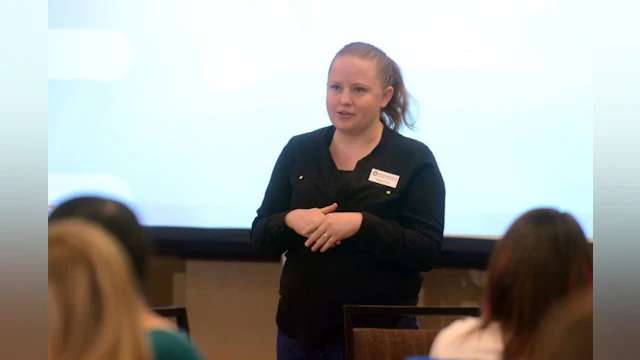Sept. 27, 2018 - The American Foundation for Suicide Prevention began as a research organization, and is currently the largest private funder of suicide prevention research. As part of her work volunteering for her local AFSP chapter, Meg Graf of Illinois has helped bring AFSP’s Research Connection program to her local area. Here, she discusses her personal connection to the cause, and how her community has benefited from the program.
How and why did you first get involved with your local AFSP chapter? What’s your connection to the cause?
I first got involved with AFSP after facing a difficult personal battle with OCD. I wanted to turn the hard part of my story into something positive, and decided to help others in regard to mental health. I first became involved in AFSP by volunteering to help crew the Chicago Overnight Out of the Darkness Walk in 2009. I now serve on the board of directors for the Illinois chapter, and work closely with our local staff to put together educational programs, including our annual Research Connection Program.
Why is suicide research important to you?
As someone living with a severe anxiety disorder, I am extremely aware that there are constantly new findings in psychiatry and mental health. I believe in evidence-based methods for effective treatment of mental health conditions, and these are found through research. The more we understand how the brain works and how to treat it, the faster we can effectively help people who are suffering.
What exactly is the Research Connection Program? How does it work?
The Research Connection Program is a way to showcase the suicide prevention research being done by AFSP-funded researchers. A chapter identifies an AFSP-funded researcher, and invites him or her to share the findings from their work with local supporters from the community.
Our chapter has had great success presenting the Research Connection Program as a ‘Lunch and Learn’ format, inviting our chapters’ constituents and community members to attend, along with local psychology and psychiatry professionals, and students. We believe in the importance of sharing new research findings with those who can use it the most, so we all learn more about suicide and how we can prevent it. This also gives our supporters an opportunity to learn more about how the funds they raise through events like the Out of the Darkness Walks are used to help with suicide prevention.
What topics were covered when you’ve brought the Research Connection Program to your community?
These events have covered several different topics, including genetic markers and suicide, the use of brain scans in researching suicide, and pediatric bipolar disorder and its connection to suicide.
Have you – or others in attendance – ever been surprised by what you’ve learned?
I don’t think surprised is the right word. I do know that people have often left feeling more hopeful. The researcher who presented at our Research Connection program in 2018, Dr. Herbert Meltzer, for instance, shared how the drug ketomine can help people in crisis. Hearing that there is something that can make a real, immediate difference in someone’s life brought a lot of hope to this year’s attendees.
What kind of impact has bringing these Research Connection presentations had on your community? Is there greater understanding?
AFSP’s Research Connection program provides our supporters with both hope and understanding, knowing that we continue to learn more and more about suicide every day, thanks to the research that’s being done. For medical professionals and students who attend, I love knowing that they leave with a greater understanding of the brain and mental health, as well as the very latest findings in the field. I look forward to working with my local staff to plan our 2019 Research Connection event, and having another great AFSP-funded researcher share more about their work to help prevent suicide.
To learn more about suicide prevention research and AFSP, click here.
To find and connect with your local AFSP chapter, click here.
